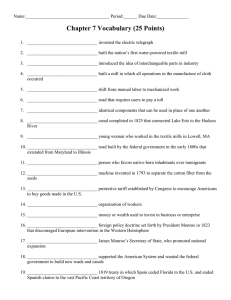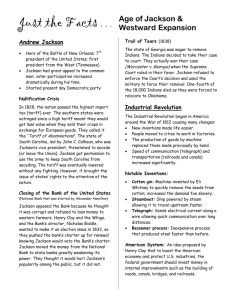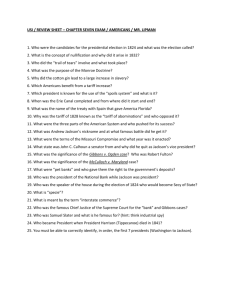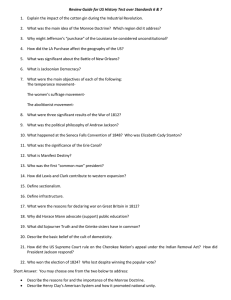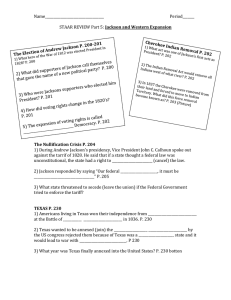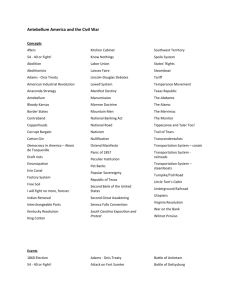U.S. History 1301
advertisement
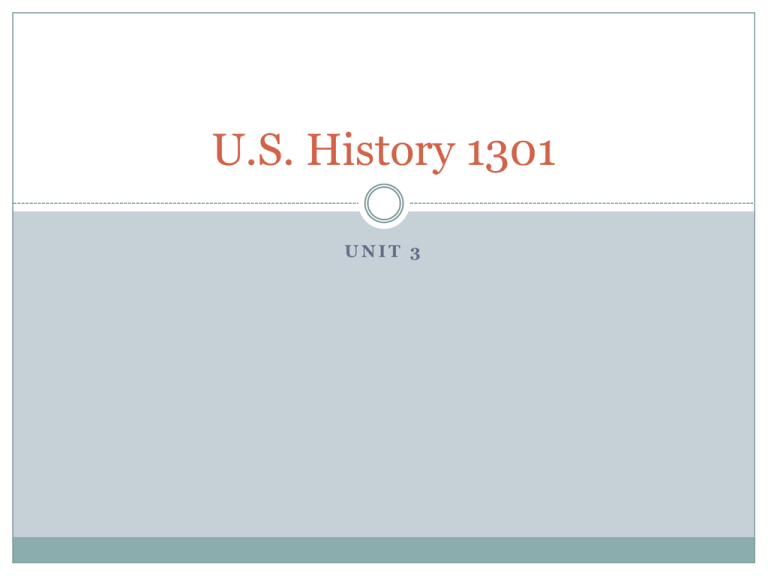
U.S. History 1301 UNIT 3 The Era of Good Feelings After the War of 1812 the Federalist Party collapsed This lasted about 10 years Political ideas of the Federalists lived on Succession of Presidents Sec. of State Madison follows Jefferson Sec. of State Monroe follows Madison Sec. of State John Quincy Adams follows Monroe The Virginia Dynasty Presidents from Jefferson to Monroe All well-cultured gentlemen Generally dull and not activist Little accomplished beyond Louisiana Purchase and the War of 1812 Infrastructure New forms of transportation built and developed Roads – Turnpikes and road networks connected cities Steamboats – Added the ability to travel upriver Canals – manmade waterways to connect ports and waterways Most famous was Erie Canal that connected Lake Erie with the Atlantic Railroads – Huge advancement in shipping freight and people These allowed for the growth of factories in the North How to pay for this? Construction projects expensive but necessary The tariff was the main source of revenue for U.S. govt. Tariff = Tax on Imported Goods Subsidies A subsidy is money given from the govt. to a private group such as an industrial business, charity, or commercial group, usually to guarantee some service in return Examples: Airlines, Planned Parenthood, Housing, Farmers Sometimes subsidies can be good, sometimes bad The Problem Most imports coming into the South Therefore the South contributes greatly to the budget Most of the tariff money going to projects in the North Tariff quickly becomes an issue between North and South Government waste exacerbates the problem Collins vs. Vanderbilt New steam technology applied to trans-Atlantic ships Cuts the passage from Europe to U.S. to two weeks Edward Collins proposes to Congress a business plan… vs. Adams-Onis Treaty Feb. 1819 the U.S. purchases Florida from Spain Cost $5 million Determined the disputed border between Mexico and the Louisiana Territory Prompted the Monroe Doctrine The Monroe Doctrine Spain weak after losing most of its holdings in the Americas France weak also after the final defeat of Napoleon The U.S. looks to prevent a comeback in the Americas The Monroe Doctrine Monroe Doctrine: No NEW European colonies in the Western Hemisphere The Monroe Doctrine How could the U.S. enforce this? Helped by Great Britain Britain also does not want to see Spain or France comeback Little real effect from the Monroe Doctrine until after the Civil War (Will play a major role in HIS 1302) The Missouri Compromise In 1819 Missouri ready to apply for statehood Wanted to become a slave state This would destroy the 11-11 free state / slave state balance Much fighting until Compromise in 1820 The Missouri Compromise Terms Missouri comes in as a slave state Maine comes in early as a free state In the future: *the Unorganized Territory will be closed to slavery *the Arkansas Territory will be open to slavery *the dividing line will be 36, 30 The Missouri Compromise The Election of 1824 Andrew Jackson, John Quincy Adams, Henry Clay All ran as Republican candidates No opposition party The election was a 3-way split Nobody won a majority of electoral votes Who becomes President? The Corrupt Bargain Under the 12th Amendment (at the time) the House of Reps. would vote on who became President Henry Clay was Speaker of the House Clay sways the house to vote for Adams Adams wins and appoints Clay as Secretary of State Jackson & supporters infuriated The Tariff of Abominations Adams and Jackson fought over the tariff after Adams elected North wanted to raise tariff to protect businesses South argued it was unconstitutional for govt. to control economy The issue will return under Jackson’s presidency The Election of 1828 By 1828 the landowning requirement was removed from voting Far more poor people able to vote Adams unpopular after Corrupt Bargain and Tariff Dirty political campaign on both sides Jackson wins by a landslide Andrew Jackson A rough man from the frontier War hero and general Strong temper Strong executive, unlike previous presidents The Spoils System Jackson begins the policy Fires many executive branch employees after taking office Replaces them with his own selections Ensured loyalty of the branch Allowed greater corruption in government Jackson as President Jackson a strange mix of pride and humility Believed that the government should be open to the people He literally opened the White House to the public on numerous occasions Jackson’s Inauguration Three Key Issues Under Jackson The Nullification Crisis concerning the Tariff The Trail of Tears concerning the Native Americans The renewal of the Bank’s charter The Nullification Crisis 1832 Congress lowers the Tariff but only slightly South disappointed South Carolina responds by declaring the Tariff void in their state The problem? State trying to overrule federal law The Nullification Crisis Jackson sees this as an attack on the Constitution Congress granted him the Force Bill which allowed him to use the military to enforce customs laws South Carolina is unsupported by other states and backs down Congress also passed a bill that would reduce the Tariff over the next few years Indian Policy By the 1820’s many Cherokees remained in Georgia They assimilated into Southern life Many owned slaves and grew cotton Along with other tribes owned 33 million acres in the Southeast Cherokees resisted all offers to get them to move Indian Policy Two key changes Jackson elected Gold discovered on Cherokee lands Georgia tries to force the Cherokee to leave Jackson backs them up with the Indian Removal Act Supreme Court initially denies the Cherokee a hearing Indian Policy Georgia began seizing Cherokee property Christian missionaries who protested were jailed Supreme Court finally tries to intervene Jackson blatantly ignored their decision Finally began a forced removal to the Oklahoma territory The Trail of Tears The Bank Functions of the Bank Lent to merchants Expedited foreign trade Handled private and business checking accounts Issued paper money backed by gold Held deposits from federal govt. Transferred govt. funds around the country Central bank of the economy Could force state banks to limit credit or encourage them to lend The Bank Jackson hated banks, especially “The Bank” This represented the feeling of many farmers and Southerners They believed the Bank gave the federal govt. too much power over the economy Bank’s charter was set to expire in 1836 Nicholas Biddle was the head of the Bank Applied for renewal of charter in 1832 The Bank The renewal passes Congress Jackson vetoes it Unleashed a storm of protest from businessmen, state bankers, and economists Jackson called a tyrant for overriding the will of the people King Andrew I Placeholder: Whigs creation, Van Buren Manifest Destiny One of the most important ideas of the early 1800’s Term coined by John L. O’Sullivan, a NY magazine editor Asserted the right of the U.S. to “overspread and to possess the whole of the continent which Providence has given us for the great experiment of liberty and federated self-government.” Manifest Destiny = The belief that the U.S. should expand to the Pacific Ocean The Oregon Country Early pioneers moved cross country, mostly fur traders Territory was shared with the British Explored and mapped the routes across the continent Helped to create the Oregon Trail The Oregon Trail Long & dangerous Many geographic obstacles Thousands of Americans went in the early 1840’s Texas (Yay!) In the 1820’s Mexico gave Moses Austin a land grant to settle Americans in Texas Moses’s son Stephen F. Austin established the first American colony in Mexico By 1835 20,000 Americans in Texas, with slaves Mexico resisted numerous attempts to buy Texas by the U.S. Texas Changes in the Mexican government made things uncomfortable in Texas Santa Anna becomes dictator and is hostile to American settlers Santa Anna marches north in 1835 to disperse growing dissent This act of aggression prompts armed response First fight came in Feb. 1836 The Alamo 187 Texans defending against over 4,000 Mexicans The Alamo was an old mission near San Antonio Texans led by William B. Travis Trying to buy time for Sam Houston to form the army Held out for 13 days, even though surrounded Santa Anna hoped to avoid a fight, but ultimately charged Heroic action spurred the independence movement San Jacinto Texas Applies for Annexation Harrison elected in 1840, died after 1 month in office John Tyler became President in 1841 Texas had applied for annexation in 1836 Jackson was too close to the end of his term Van Buren was too unpopular Tyler finally able to secure annexation Texas Annexation 2 reasons people opposed Texas would enter as a slave state Mexico would probably declare war Senate refused to pass annexation treaty until March 1845, just before Tyler leaves office James Polk elected in 1844, takes office in 1845 Polk a strong proponent of Manifest Destiny Issues with Britain Increased U.S. presence in Oregon leads to conflict Britain and U.S. both claiming key territory The U.S. declares “54-40 or fight!” Britain goaded by Mexico Ultimately a treaty was signed in 1846 cutting the territory in half The Slidell Mission John Slidell sent to Mexico to negotiate Offered to pay Texas debts owed to Mexico for $3.25 million Offered $5 million for New Mexico and $25 million for California Expected the mission to succeed Instead Mexico refused to meet with Slidell The Border Issue The treaty granting Texas independence claimed the border was on the Rio Grande The Mexican govt. claimed it was invalid Once Texas annexed this becomes a U.S. problem Polk sends Gen. Zachary Taylor to the Rio Grande as a defensive measure Mexico considers this an invasion and an act of war War with Mexico Gen. Zachary Taylor led army to the Rio Grande Nicknamed “Old Rough-and-Ready” Charismatic general, liked by his men, also a Whig First battle at Palo Alto in Texas, May 8, 1846 Taylor then crosses the Rio Grande into Mexico at Matamoros Due to discipline issues, Taylor forced to move further south, towards Monterrey Politics Interferes Taylor succeeds at Monterrey, generously allows Mexican army to withdraw Draws criticism from U.S. government Still, Taylor a popular figure Polk (Democrat) unwilling to let a Taylor (Whig) take credit for the final victory Orders Taylor to hold Monterrey but transfers most of his army to Winfield Scott in New Orleans The Last Campaign Gen. Winfield Scott to lead an attack on Mexico City from New Orleans Scott not nearly as popular as Taylor Nicknamed “Old Fuss-and-Feathers” The plan was to land at Veracruz and march to Mexico City After a series of battles Mexico City falls Santa Anna flees Negotiations Remnants of Mexican govt. left to negotiate surrender Treaty of Guadalupe Hidalgo ends the war in 1848 Forced Mexico to sell all territory between the Pacific and Texas for $15 million Also paid $3.5 million in debt to Mexico Treaty somewhat unpopular, but still passed the Senate Results Mexican War achieved Manifest Destiny Only one more land purchase before the final borders of the 48 contiguous states Ironically, the land added almost killed the U.S. In many ways, the Mexican War was a forerunner to the Civil War Religious Change Charles Grandison Finney Key figure in the Second Great Awakening Focused on revival and new converts Gave rise to Perfectionism Religious Change Many denominations created or changed significantly Many key Calvinist and Orthodox doctrines rejected Growth in major denominations: Methodist, Baptist, Presbyterian New or small groups also grew: Unitarians, Mormons, Oneidans Perfectionism New belief propagated in 2nd Great Awakening Believed that human beings could become perfect and completely rid themselves of sin Sin defined as selfishness Argued that people could become entirely selfless This applied both on individual and corporate levels Gave a strong religious impetus for social reform Social Change Religious change will in turn affect social change Many reform movements Prisons Asylums Temperance Women’s rights Antislavery Antislavery Grew with religious revival Still a mix of views Some people completely abolitionist Others simply against expansion Race often not a factor Lincoln “I will say then that I am not, nor ever have been in favor of bringing about in anyway the social and political equality of the white and black races – that I am not nor ever have been in favor of making voters or jurors of negroes, nor of qualifying them to hold office, nor to intermarry with white people; and I will say in addition to this that there is a physical difference between the white and black races which I believe will forever forbid the two races living together on terms of social and political equality… Lincoln And inasmuch as they cannot so live, while they do remain together there must be the position of superior and inferior, and I as much as any other man am in favor of having the superior position assigned to the white race. I say upon this occasion I do not perceive that because the white man is to have the superior position the negro should be denied everything.” Lincoln-Douglas Debate, Sept. 1858 Lincoln I have never said anything to the contrary, but I hold that notwithstanding all this, there is no reason in the world why the negro is not entitled to all the natural rights enumerated in the Declaration of Independence, the right to life, liberty and the pursuit of happiness. I hold that he is as much entitled to these as the white man. I agree with Judge Douglas he is not my equal in many respects – certainly not in color, perhaps not in moral or intellectual endowment. But in the right to eat the bread, without leave of anybody else, which his own hand earns, he is my equal and the equal of Judge Douglas, and the equal of every living man.” Lincoln-Douglas Debate, Aug. 1858 Lincoln “My paramount object in this struggle is to save the Union, and is not either to save or to destroy slavery. If I could save the Union without freeing any slave I would do it, and if I could save it by freeing all the slaves I would do it; and if I could save it by freeing some and leaving others alone I would also do that. What I do about slavery, and the colored race, I do because I believe it helps to save the Union; and what I forbear, I forbear because I do not believe it would help save the Union… Lincoln I shall do less whenever I shall believe what I am doing hurts the cause, and I shall do more whenever I shall believe doing more will help the cause.” Letter of Abraham Lincoln, Aug. 1862 Placeholder (slaves vs workers) Immigration Largest group from Ireland, followed by Germany Millions immigrated during the 1840’s and 1850’s Irish especially faced discrimination when they arrived Anti-immigration known as “Nativism” Reasons for Nativism Irish were Catholic Stereotypes about immigrants Immigrants usually poor Immigrants took jobs and lowered wages Little assimilation on the part of immigrants Immigrants led to urbanization, lowering quality of life in the cities Urbanization Massive increase to city populations Mostly happened in the North One result of the Industrial Revolution A trend that still continues today Led to many problems within the cities Problems of Urbanization Slum neighborhoods and ghettos Transportation Waste disposal Disease Crime Fire hazards Water supply Political corruption
